
James Harold Doolittle was an American military general and aviation pioneer who received the Medal of Honor for his daring raid on Japan during World War II, known as the Doolittle Raid in his honor. He made early coast-to-coast flights, record-breaking speed flights, won many flying races, and helped develop flight-test instrument flying.

The Doolittle Raid, also known as Doolittle's Raid, as well as the Tokyo Raid, was an air raid on 18 April 1942 by the United States on the Japanese capital Tokyo and other places on Honshu during World War II. It was the first American air operation to strike the Japanese archipelago. Although the raid caused comparatively minor damage, it demonstrated that the Japanese mainland was vulnerable to American air attacks. It served as an initial retaliation for the December 7, 1941, attack on Pearl Harbor, and provided an important boost to American morale. The raid was planned by, led by, and named after Lieutenant Colonel James Doolittle. It was one of six American carrier raids against Japan and Japanese-held territories conducted in the first half of 1942 as part of the undertaken strategy.
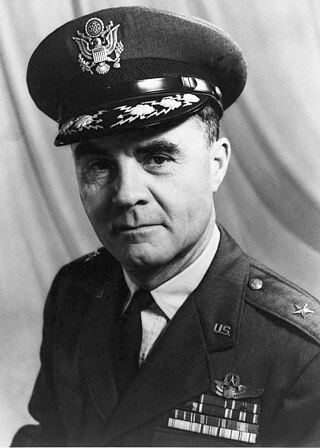
Paul Warfield Tibbets Jr. was a brigadier general in the United States Air Force. He is best known as the aircraft captain who flew the B-29 Superfortress known as the Enola Gay when it dropped a Little Boy, the first of two atomic bombs used in warfare, on the Japanese city of Hiroshima.

The Air Medal (AM) is a military decoration of the United States Armed Forces. It was created in 1942 and is awarded for single acts of heroism or meritorious achievement while participating in aerial flight.
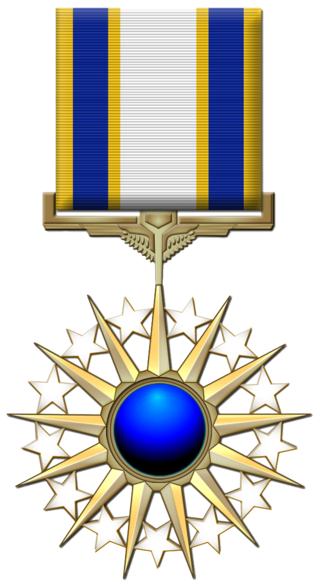
The Distinguished Service Medal (DSM) is a military decoration of the United States Air Force and United States Space Force and is presented to airmen and guardians to recognize distinguished and exceptionally meritorious service to the United States while serving in a duty or position of great responsibility. The Distinguished Service Medal was created by an act of the United States Congress on July 6, 1960 and was first awarded in 1965. Prior to the creation of the Distinguished Service Medal in 1960, United States Air Force airmen were awarded the Army Distinguished Service Medal.
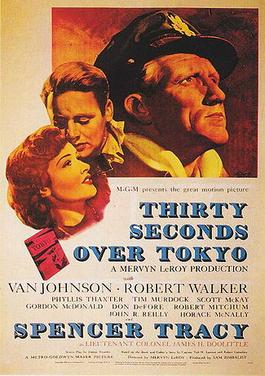
Thirty Seconds Over Tokyo is a 1944 American war film produced by Metro-Goldwyn-Mayer. The screenplay by Dalton Trumbo is based on the 1943 book of the same name by Captain Ted W. Lawson. Lawson was a pilot on the historic Doolittle Raid, America's first retaliatory air strike against Japan, four months after the December 7, 1941, Japanese attack on Pearl Harbor. The raid was planned, led by, and named after United States Army Air Forces Lieutenant Colonel James Doolittle, who was promoted two ranks, to Brigadier General, the day after the raid.

Major Ted William Lawson was an American officer in the United States Army Air Forces, who is known as the author of Thirty Seconds Over Tokyo, a memoir of his participation in the Doolittle Raid on Tokyo in 1942. The book was subsequently adapted into the 1944 film of the same name starring Spencer Tracy, Van Johnson and Robert Mitchum.

Robert John Meder was a lieutenant in the United States Army Air Forces who participated in the Doolittle Raid. In February 1942, he volunteered to participate in the raid, which took place on April 18 that year. Meder and his bomber crew was captured by the Japanese after the completion of his bombing mission. He died while in Japanese captivity in 1943.
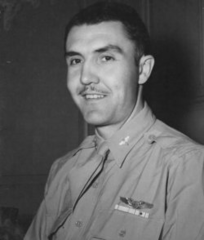
Chase Jay Nielsen was a career officer in the U.S. Air Force. He participated in the Doolittle Raid in 1942 and was one of the four surviving prisoners of war from that raid.
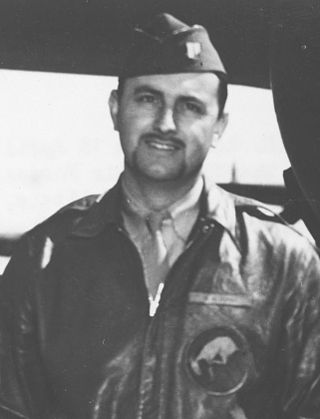
David M. Jones served with distinction as a pilot and general officer, first with the U.S. Army Air Corps and later with the United States Army Air Forces and, after September 18, 1947, the United States Air Force. His record during World War II includes being one of the Doolittle Raiders whose exploits in April 1942 were dramatized in the film Thirty Seconds Over Tokyo. He then flew combat missions over North Africa, where he was shot down. He was a German prisoner of war for two and a half years, helping with the April 1944 mass escape at Stalag Luft III, and was the inspiration for Steve McQueen's fictional character, USAAF Captain Virgil Hilts, which was dramatized in the 1963 movie The Great Escape.

The Japanese occupation of Attu was the result of an invasion of the Aleutian Islands in Alaska during World War II. Imperial Japanese Army troops landed on 7 June 1942, the day after the invasion of nearby Kiska. Along with the Kiska landing, it was the first time that the continental United States was invaded and occupied by a foreign power since the War of 1812, and was the second of the only two invasions of the United States during World War II. The occupation ended with the Allied victory in the Battle of Attu on 30 May 1943.

Edwin A. Loberg was a colonel in the United States Air Force.

Richard Eugene Cole was a United States Air Force colonel. During World War II, he was one of the airmen who took part in the Doolittle Raid on Tokyo, Japan, on April 18, 1942. He served as the co-pilot to Lieutenant Colonel Jimmy Doolittle in the lead airplane of the raid by sixteen B-25 bombers, which for the first time took off from an aircraft carrier on a bombing mission.

Thomas Carson Griffin was a United States Army Air Forces navigator who served during World War II. He was one of the eighty Doolittle Raiders who bombed Japan in April 1942. After the Doolittle Raid, he was relocated to North Africa and was shot down during an air raid in 1943, spending time in a prisoner-of-war camp until he was rescued in early 1945.

Colonel Charles Ross Greening was an accomplished pilot and artist. He was one of the 73 men out of the 80 Doolittle Raiders to survive the attack and return home to his family.

Denver Vernon Truelove was a United States Army Air Forces bombardier who served during World War II. He was one of the eighty Doolittle Raiders who bombed Japan in April 1942. After the Doolittle Raid, Truelove was involved briefly in North Africa. His awards included the Distinguished Flying Cross and Purple Heart.
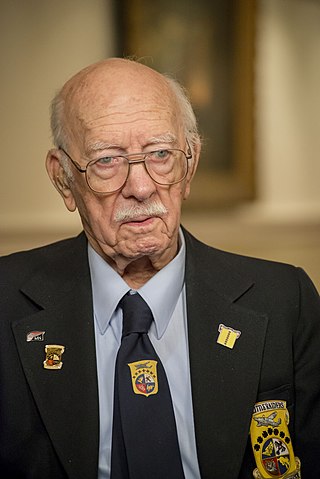
Lieutenant Colonel Edward J. Saylor, Ret. served in the U.S. Air Force. He was a veteran of World War II and participated in the Doolittle Raid on Japan on April 18, 1942. Saylor was one of the last four surviving Doolittle Raiders at the time of his death in 2015.

William ‘Billy Jack’ Dieter was a sergeant in the United States Army Air Corps. Dieter was a bombardier on the Green Hornet, the sixth plane to take off from a US carrier as part of the Doolittle Raid, a bold long-range retaliatory air raid on the Japanese main islands, on April 18, 1942, four months after the attack on Pearl Harbor. The attack was a major morale booster for the United States. Dieter was one of only three airmen to die in the raid itself, when his B-25 Mitchell, 'Green Hornet', crashed on the coast of China, having run out of fuel.
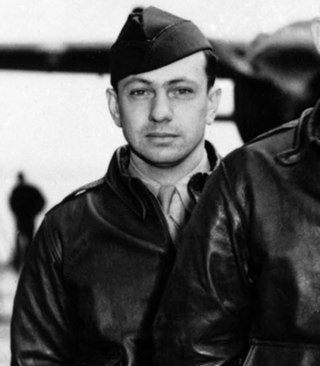
Lieutenant Colonel Horace Ellis Crouch was an American military aviator whose career included service with the United States Army Air Corps and United States Air Force, he was a combat veteran of World War II and the Korean War who served as one of the crewmembers on the Doolittle Raid.
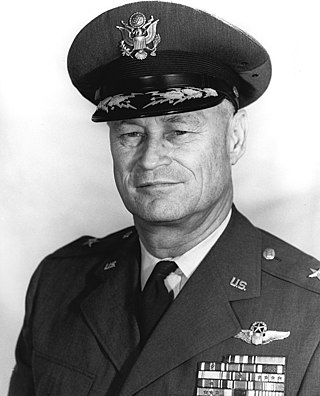
John Allen Hilger was a brigadier general in the United States Air Force. Born in Sherman, Texas, Hilger graduated from Agricultural and Mechanical College of Texas and was commissioned in the U.S. Army Air Corps in 1934. He was assigned to the 89th Reconnaissance Squadron as commander in May 1940; flying North American B-25 Mitchell bombers on anti-submarine patrols from December 1941.




















